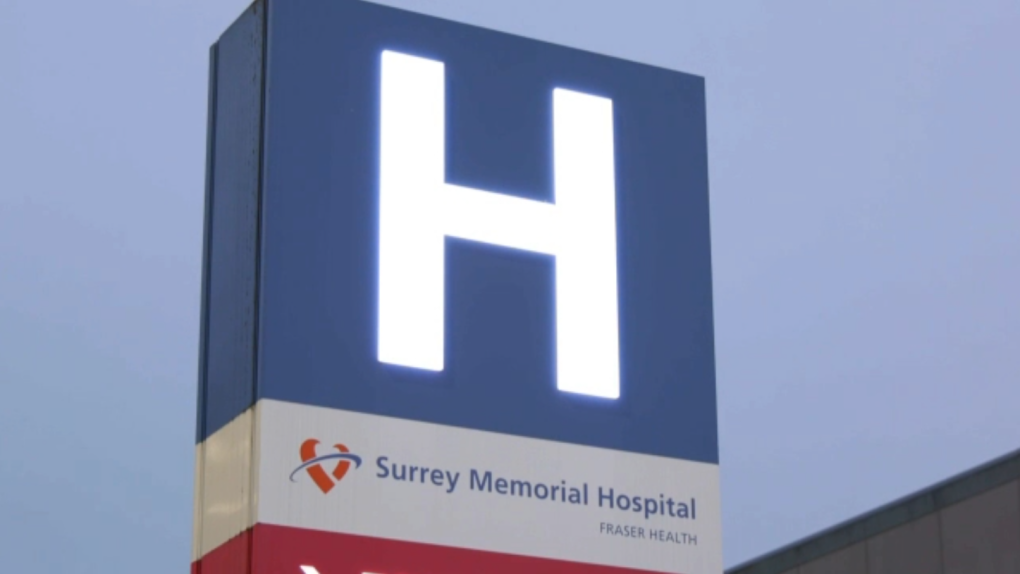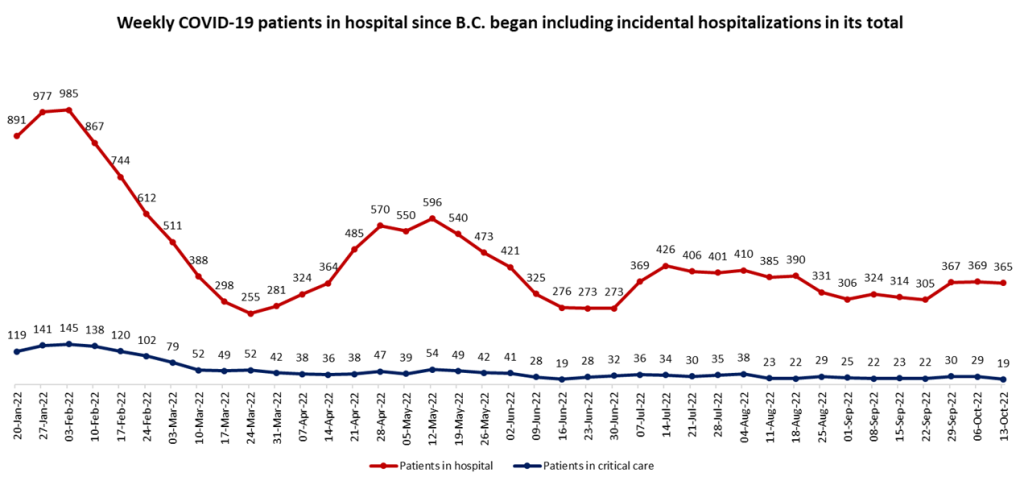B.C. COVID-19 numbers largely unchanged in latest update
 A sign at the entrance to Surrey Memorial Hospital is seen on Saturday, Feb. 5, 2022. (CTV)
A sign at the entrance to Surrey Memorial Hospital is seen on Saturday, Feb. 5, 2022. (CTV)
After a notable increase at the end of September, the number of people in hospital with COVID-19 in B.C. has remained relatively flat over the last three weeks.
There were 365 test-positive patients in hospital as of Thursday, down four from the previous week and two from the week before that, but still 60 more than were hospitalized as of Sept. 22.
 This graph shows the number of test-positive COVID-19 patients in B.C. hospitals on Thursdays since the province switched to a "hospital census" model in January. (CTV)
This graph shows the number of test-positive COVID-19 patients in B.C. hospitals on Thursdays since the province switched to a "hospital census" model in January. (CTV)
Notably, the number of patients in critical care fell significantly this week, dropping from 29 to 19, which ties the lowest total B.C. has seen all year.
The hospital populations released each week by the B.C. Centre for Disease Control reflect a "hospital census" approach that includes both those with serious cases of COVID-19 requiring hospitalization and those who are in hospital for other reasons and test positive incidentally.
Provincial officials have said between 40 and 50 per cent of people included in the weekly hospitalization total are typically there because of COVID, while the rest are in the incidental category.
Since the province began tracking hospitalizations in this way in January, there have been as many as 985 test-positive patients in hospital and as few as 255.
CASES AND WASTEWATER
Like the hospital census, the number of new coronavirus cases reported this week was essentially unchanged from the previous one.
The BCCDC said 697 people tested positive for COVID-19 in lab-based tests during the week of Oct. 2 to 8. Last week, it reported the same number of positive tests for the week of Sept. 25 to Oct. 1, though that week's total has been revised down to 696 in the latest report.
Official case counts include only the results of lab-based tests. The BCCDC does not track the results of at-home, rapid antigen tests, which are the only type of test available to most B.C. residents with symptoms.
The independent B.C. COVID-19 Modelling Group has estimated that official case counts are off by 100-fold, relative to the actual number of new infections the province is seeing each week.
If that estimate is correct, then there were approximately 69,700 new cases in B.C. during the week that ended Oct. 8, or just under 10,000 new infections per day.
One metric that can help quantify the trend in cases not captured by the official count is wastewater surveillance.
According to the BCCDC's latest situation report, four of the five wastewater treatment plants in Metro Vancouver have seen increases in viral concentrations over the last few weeks.
Most of these increases have been small, however, and the two plants that have seen the most significant jumps are also the two that the BCCDC flags as having more variable viral loads than others.
'FALL SURGE' COMING?
For months, B.C. health officials have been warning of the possibility of a "fall surge" in COVID-19 cases, as well as cases of influenza and other respiratory illnesses.
Late last month, provincial health officer Dr. Bonnie Henry and Health Minister Adrian Dix outlined their plans to free up hundreds of hospital beds by moving current patients whose care needs are suitable for smaller facilities into community clinics and long-term care homes.
That proposal was met with skepticism from the BC Care Providers Association, which suggested the goal may not be attainable given the staff shortages plaguing the health-care system.
While the numbers released Thursday do not point to an ongoing "fall surge," it's also notable that "fall" hasn't yet begun in much of the province, at least in terms of the weather.
Vancouver Island, the Lower Mainland, the Sunshine Coast and the Southern Interior have all seen warmer, dryer weather than is typical for this time of year.
Part of the reason Henry has said she expects a fall surge is that cooler, wetter weather tends to lead people to gather indoors, where coronavirus transmission is easier.
VACCINATION DATA
In hopes of mitigating the effects of a fall surge, Henry and Dix encouraged B.C. residents to get vaccinated against both COVID-19 and influenza.
According to the BCCDC's COVID-19 dashboard, the province administered 152,758 new doses of vaccine during the week of Oct. 2 through 8, nearly all of them the bivalent vaccine that targets the Omicron variants of the coronavirus.
Data from the dashboard indicates that 131,861 – or roughly 86 per cent – of the doses administered during the week were considered fourth doses, meaning they were administered to people who got a booster dose before the bivalent vaccines became available.
CTVNews.ca Top Stories

Large numbers of New York City police officers begin entering Columbia University campus
Large numbers of New York City police officers began entering the Columbia University late Tuesday as dozens of pro-Palestinian protesters remained on the campus.
Poilievre kicked out of Commons after calling Prime Minister Justin Trudeau 'wacko'
Testy exchanges between the prime minister and his chief opponent ended with the Opposition leader and one of his MPs being ejected from the House of Commons on Tuesday -- and the rest of Conservative caucus walking out of the chamber in protest.
Baby, grandparents among 4 people killed in wrong-way police chase on Ontario's Hwy. 401
A police chase which started with a liquor store robbery in Bowmanville Monday night ended in tragedy some 20 minutes later when a suspect fleeing police entered Highway 401 in the wrong direction and caused a pileup which killed an infant and the child's grandparents, as well as the suspect, investigators say.
Freeland leaves capital gains tax change out of coming budget implementation bill, here's why
Deputy Prime Minister and Finance Minister Chrystia Freeland will be tabling yet another omnibus bill to pass a sweeping range of measures promised in her April 16 federal budget, though left out of the legislation will be the government's proposed capital gains tax change.
Sword-wielding man attacks passersby in London, killing a 14-year-old boy and injuring 4 others
A man wielding a sword attacked members of the public and police officers in a northeast London suburb Tuesday, killing a 14-year-old boy and injuring four other people, British authorities said.
Man dies after suffering cardiac arrest while waiting in ER, widow wants investigation
When an ambulance took David Lippert to the hospital in March of 2023, the 68-year-old Kitchener, Ont., executive was hoping to find out why he was feeling weak and unable to walk. Some 24 hours later, he was found unresponsive in the ER.
CSE says it shared information on Chinese hacking of parliamentarians in 2022
While several MPs and senators say they were only recently made aware of China-backed hackers targeting them, the Communications Security Establishment, one of Canada's intelligence agencies, says it shared information about the incident with parliamentary officials in June of 2022.
WATCH Arnold Schwarzenegger spotted filming in Elora, Ont.
The name of the project has not been officially released although it’s widely believed to be the Netflix series FUBAR.
Eviction for landlord's use was legitimate, despite owners' partial move, B.C. court rules
A B.C. judge has upheld the eviction of a family from their North Vancouver townhouse, finding that the landlords did not take an unreasonable amount of time to move into the home after the tenants vacated it.

































